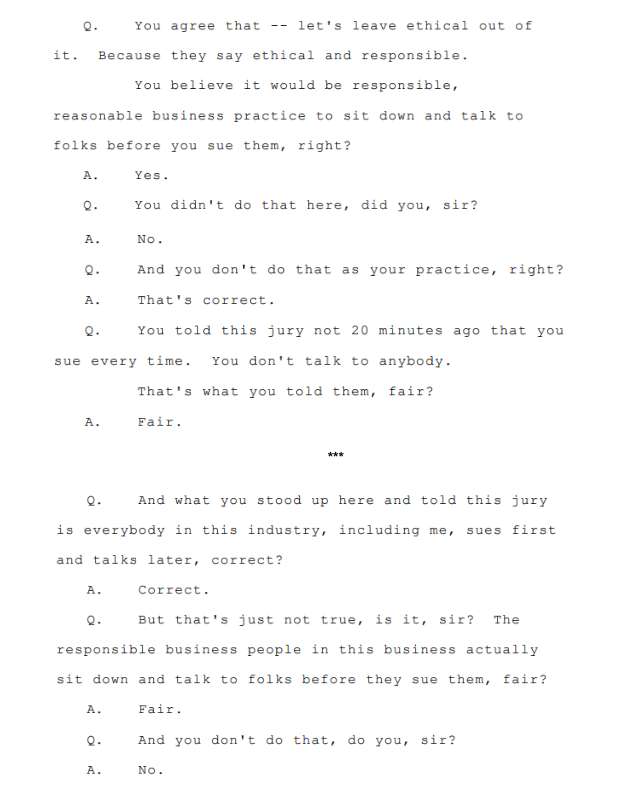- cross-posted to:
- [email protected]
- cross-posted to:
- [email protected]
This is absolutely awesome: 👍😎
Project Jengo is Cloudflare’s effort to fight back against patent trolls by flipping the incentive structure that has encouraged the growth of patent trolls who extract settlements out of companies using frivolous lawsuits. We do this by asking the public to help identify prior art that can invalidate any of the patents that a troll holds, not just the ones that are asserted against Cloudflare.
Emphasis by me.
CloudFlare makes more than a billion dollars a year in revenue. The work done for this project is probably worth millions to them and they paid out $100,000. That sounds like bullshit to me. Let corporations hire lawyers instead of doing their work for a pittance.
They should have increased the payout. It should have been a percentage of what CF would have paid had they paid the troll.
I don’t expect attorneys to be experts in technical work. Even those who are won’t have the same experience as the literal millions of techies out there who know really obscure technology.
I’ve worked on processing submissions for this project. Honestly, it probably ends up just costing them more to do this program, which is mostly just a paid PR activity. The overwhelming majority of submissions, and I mean like 99%, are either not prior art in the sense of patent law or were already retrieved by the law firm on the case.
It’s like an IRL DDOS
And it’s less annoying than a stadium full of people with vuvuzelas.
Patents shouldn’t be valid for more than 5 years imo. If you can’t make a large enough profit from your idea in 5 years maybe it wasn’t that good or original.
The original idea with patents is to help protect small inventors from being run over by bigger corporations.
But the result is more often the opposite, where small inventors that have a genuinely profitable novel product, is quickly forced to bankruptcy by frivolous patent suits, even when the new product is patented, and when bankrupt bought for peanuts by the bigger corp.The other main basis for patents is that the technology should not be lost, in case of the inventors death.
But the way tech works today, that is no-longer relevant.5 year patent would absolutely be better than what we have IMO.
As someone who was awarded several patents, these things were not made to be a source of infinite money forever!
Up there with our copyright law it’s a system that has been horribly abused to the benefit of super powerful corporations that run everything.
I have a friend who works for the city and invented a brilliant system to remove weed from pebble driveways, without using weed killers. They wrote an article in the local paper, and he was even awarded by the mayor.
Several people recommended to him to patent his system, and he contacted a patent lawyer to do just that.
The lawyer praised his idea, and stated he could make the paperwork to get the patent, for the small fee of some insane amount.
Luckily he pulled out, and did not go forward.It turns out that his idea was already in production in Germany. The money to the patent lawyer would have been a complete waste.
The moral of the story is, that the only sure winners on patents, are the lawyers.
Edit PS:
Another story, a guy had some patents he found out were being used by a really big company.
He contacted the company to make an agreement on the use of his patents, and the response he got back was basically: “Sue us”.
Those big companies have lawyers on their pay role, patent cases are insanely expensive, in part because patent lawyers are among the most expensive, and it’s near impossible to predict the outcome of a case. His chances of even affording the case were slim, and the chance of winning even if he was obviously right were even slimmer. Because the big company will just hire “experts” to claim non violation. And the little guy can’t afford to match it.So again the patents didn’t help the little guy.
That’s really cool! My invention was a means of accelerated processing for images that makes it cheaper to produce what used to be dedicated color processing chips for digital cameras. While these are no longer used today, it did find some applications. At this point there’s a few libraries out there implementing some of it as open source with my explicit permission in the hopes they might find some use in the future and contribute to society that way.
Cool, digital photography is an area that has had insane development IMO.
I’m absolutely flabbergasted by the digital photography capabilities of modern phones. high res, image stabilization, and of course color mapping/filtering.
The processing power needed is insane. 4K movies are 8 megapixel at 3 colors 30 fps, and it’s 750 million sub pixels, that need to be processed per second, and we do that on a cheap tiny handheld device! The better ones can handle 8K and that’s 3 Billion sub pixels per second!It’s impressive that you have been part of it. 👍 😎
Following your edit, I’m sorry to hear that the patent system couldn’t protect him. This isn’t the first case I’ve heard of. Honestly, you have to be rich, which I think is completely intentional to ensure that only big business can benefit from a patent.
Some companies are just scumbags, and the bigger they are the worse it gets.
Same for copyright law. The point was to give creators a few years to profit from their work before it goes into public domain.
Also the patent office needs to employ actual specialists and reject the bullshit patents, like rounded rectangles.
Exactly, and Christ the Apple vs Samsung on Samsung copying the iPad “design” was ridiculous!
I don’t know if that was what you meant, but that’s what I immediately thought of.Or things Nintendo does
Disagree. Look at Sawstop. It took years to even get to the patent filing phase. Then he tried to get companies to adopt it. They didn’t. So he spent years building a company and manufacturing base to support it. By the time he finally got things into stores and had a chance to pay back his investment the patent would have expired under your idea. There would have been zero incentive to do all that investment and the technology would have never become available.
Your five year rule would harm anyone not already extremely wealthy. It would further incentivize corporations to maintain control over markets. It would also create a situation where companies would be trying to recoup all their investment costs in that 5 year period which would result in extremely high prices. Like the pharma companies on steroids charging a 5000% markup.
How’s about a patent that expires 5 years after its first use by a billion+ dollar company? 5 years after it is used in more than 10,000 products? 5 years after its licensing has yielded over $1M in profit? 5 years after spending over $100k on advertising? 5 years after your first major court settlement?
I think there are ways to protect individual innovators but also lessen patent abuse
The more fine-tooth details you put in it the easier it is to exploit or get exceptions. It’s how you have a tax code where 10% tells you what to pay and 90% tells you how not to pay it.
But the only thing I would change would be a software patents should be dramatically shorter than hardware patents given the life cycle of software.
deleted by creator
The patents are expiring and once they do regulators will kind of have their hand forced. Trying to mandate a solution only available through one provider is a nonstarter. And that’s part of the darker side of Sawstop. He did try to have it mandated by law after companies didn’t buy in. It was a very self serving move that made a lot of enemies.
So I’d never heard of sawstop so I looked it up.
Why couldn’t he get anyone interested in using that? It’s brilliant.
If one company took it up it would have created a war in the industry. Everyone decided to play it safe with business as usual. Because companies don’t care about anything other than profit.
Technically there is no incentive for me to get out of my bed but i still do.
Lucky you that there is someone providing for you.
The quality of an invention has nothing to do with profitability. People actively fight competing products and ideas. A good invention is worth nothing unless you whore it out to existing industry
Instead of a flat five years across the board, length of time could be variable based on assets and political connectedness
…and thereby including potentially even more corruption in that process. Who decides what patent lives for how long?
I was channeling what Disney might suggest 😉
Woah. I misinterpreted your (in hindsight) obvious sarcasm
Maybe make it based on sales. $X, Y sales, or Z years, whichever comes first.
Sweeeeeet.

Very satisfying
Love the content, but that format is what I stare at every day so now I’m back at work in my free time!
And on that day, their hearts grew three times their sizes.
Their doctors found this alarming
I’m just picturing a new version of the Grinch who stole Christmas where he’s clutching his chest in pain.









